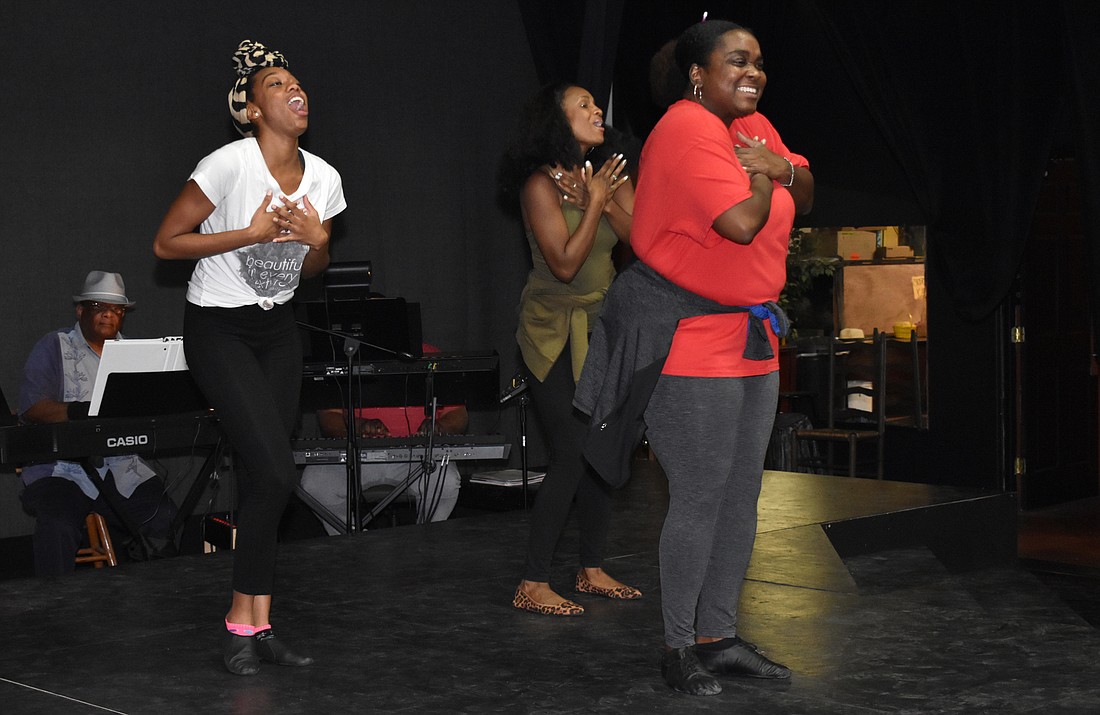- November 23, 2024
-
-
Loading

Loading

Nate Jacobs fell in love with Broadway without seeing a single show.
It wasn’t a magical trip to New York City or the show-stopping voice of Jennifer Holliday commanding the radio that ignited the love affair. Jacobs, artistic director and founder of Westcoast Black Theatre Troupe, fell hard for Broadway by listening to his brother’s rave reviews of “Dreamgirls” and other shows he saw on the Great White Way.
“I didn’t know I had a theater company living inside me at the time,” Jacobs says. “Of course, now it’s really clear why those reports from my brother’s phone calls excited me the way they did.”
Now, more than three decades later, Jacobs is sharing his love for America’s most beloved theater district with his latest original WBTT production, “Broadway in Black.”
The show was inspired by a children’s theater piece of the same name that he created some 15 years ago. That show was a youth revue, but this time around, he wanted to create a full-fledged professional production that honored the award-winning shows and performers who opened the door for black artists on Broadway.
What resulted is a cast of 13 and a three-piece band that will work together to perform nearly 50 songs — some in their entirety, some in snippets, and others in medleys — that are considered legendary pieces performed by black Broadway stars.
Jacobs says this show carries a meaning that is deeply personal for him and his cast. He notes that black characters on Broadway were played by white performers in blackface until the early 1900s. It wasn’t until 1910 that the first black performer was considered an equal alongside his white counterparts. That’s when Bert Williams took the stage on Broadway in “The Ziegfeld Follies.”
He says because they’re paying homage to the artists who paved the way for black performers on Broadway and elsewhere, he expects excellence from his cast.
“All these artists studied and worked hard and prayed and cried and scratched and crawled to get up the ladder, so you step out and represent them well,” he tells his cast. “I’m not going to accept anything less than that. I want your best.”
Not only are cast members expected to represent their predecessors with honor and integrity, they’re expected to do so by performing some of the most difficult songs they’ve ever been assigned.
Jacobs says he could see many cast members “shaking their knees” when he handed them their music, but he’s proud of his cast for committing to the challenge of giving audiences a dynamic theater experience that he calls a “show within a show.”
“We go from deeply moving moments to high spirited, over-the-top moments to hot and sizzling moments, and it's like watching the whole strip of Broadway in one evening,” Jacobs says.
Audience members can expect to hear some of their favorite songs from older classic musicals such as “Cabin in the Sky,” “Porgy and Bess” and “The Wiz” as well as more recent favorites from shows such as “Ragtime,” “Dreamgirls” and “Once on this Island.”
Cast member Michael Mendez has been with WBTT for six years, but he says this show has a different feel than the others he’s been in.
Usually the performers learn the music before they begin choreography, but for “Broadway in Black,” they’ve learned both simultaneously, which Mendez says has taken them to a “different level in the show process.”
He also feels a sense of responsibility to pay respects to the black performers who helped him get to where he is today.
“Being the only black theater in a large radius, we are stewards of black history in a sense, whether we want to be or not,” he says. “So we have to keep our history alive by not only paying homage to what was done but also what will be done for future playwrights.”
Jacobs says the goal is not only to honor these Broadway idols, but to honor the larger narrative of black people in the United States.
“The purpose of the theater, especially the black theater, is to keep history and stories alive,” Jacobs says. “If we don’t keep our history — our stories, our culture, our uniqueness — alive and propagate it throughout the generations, then it dies.”
For Jacobs, this purpose is particularly personal. Part of his heart will always be on Broadway.
Teresa Stanley, an original member of WBTT who Jacobs mentored from childhood, left the troupe in 2007 to perform in “The Color Purple” on Broadway. When Jacobs’ friend flew him to New York City to see her perform, he cried the entire show.
Stanley took him behind the curtain after the show and pulled him onstage. They looked out into the empty theater and she uttered three words so powerful, they’ve stayed with him.
“You’re on Broadway,” she said.